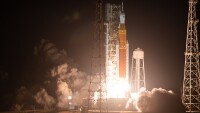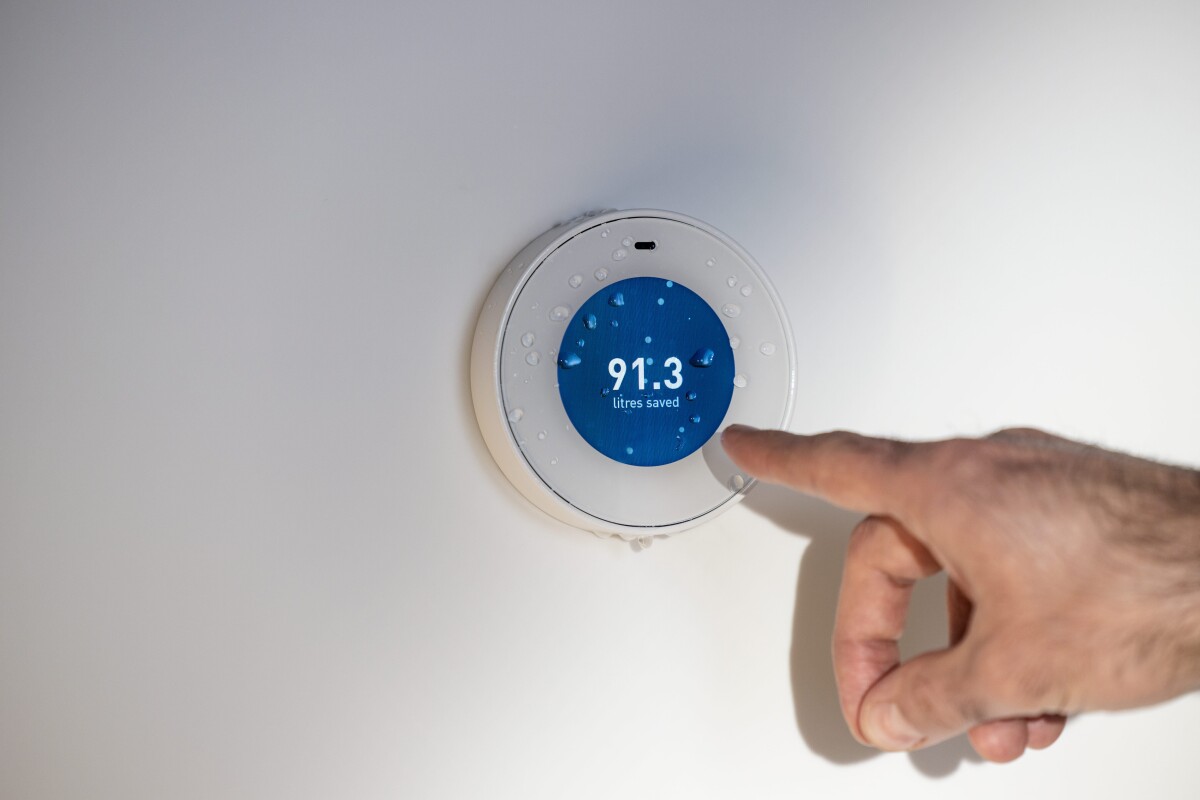(Editor’s note: This article is the latest installment in a series by Amazon Science delving into the science behind products and services of companies in which Amazon has invested. The Alexa Fund invested in Orbital Systems in April 2022.)
Americans use an average of 60 gallons of clean water per person inside their homes each day, nearly half of which goes to toilets and showers. Low-flow fixtures and other conservation strategies have reduced per-capita consumption since the 1980s. But the scarcity of water on Earth — less than 1% of the water on our planet is drinkable — demands that we use it more wisely.

Orbital Systems aims to meet this demand with products inspired by a setting where water is even more scarce: Mars.
As a master’s student in industrial design, founder and CEO Mehrdad Mahdjoubi collaborated with NASA scientists on a plan for long-term human habitation on Mars.
“The limitations on available resources meant that we had to be creative,” Mahdjoubi says.
He realized that other essential resources, like energy and nutrients, tend to flow in a circular manner. “With energy, we have the sun. Nutrients cycle between the physical environment and living organisms. But water use is not like that,” Mahdjoubi explains.
Mahdjoubi started Orbital Systems in 2012 to develop resource-saving products for consumers on Earth. The Orbital Shower was the first product to launch. The shower starts with less than a gallon of water, and the system checks the water quality 20 times per second during operation. Water too contaminated to be reused is discarded and replaced, and the rest is filtered and exposed to ultraviolet light before being recirculated. Because the recirculated water is warm, it requires much less energy for heating. The Orbital Shower uses up to 90% less water and 80% less energy than a conventional shower.
Next came the Orbital Tap, which reuses water from a sink to flush a toilet. “It’s a solution to the age-old problem of flushing clean drinking water down the toilet,” Mahdjoubi says.
Orbital products are available to hotel chains, real-estate developers, and individual consumers in Sweden, Denmark, and Germany. Mahdjoubi is seeking partners and installers to enable expansion to markets in North America and beyond.
Orbital users can start a customized shower — lighting, music, flow, temperature, duration, etc. — with a single command via an Alexa integration.
Mahdjoubi spoke with Amazon Science about water use from Mars to ancient Rome to our own bathrooms and what differentiates Orbital Systems’ products from other resource-saving strategies.
- Q.
What inspired you to design sustainable water systems for Mars and implement them on Earth?
A.While I was studying industrial design at Lund University, I had the opportunity to go to Johnson Space Center and take part in a project with NASA. The goal was to enable an earthly living standard on Mars.
Establishing a Mars colony required us to solve a lot of issues related to resource management, given the strict resource limitations.
There are three resources that humans need in addition to oxygen. One is energy, the second is water, and the third is nutrients. I started looking at how we handle resources on Earth, and how we might translate the positive aspects to a new setting without repeating the more foolish aspects.
Every resource has a supply side and a demand side. In the energy sector, we’ve walked a pretty long way on the demand side. A hundred or two hundred years ago, all of our focus in energy was on the supply side: pump up more oil, pump up more gas, produce more. Then around the second oil crisis in the ‘70s, there was a massive realization that we can’t just focus on pumping up more, creating more energy. We need to think about how we use it.

Orbital's CEO says their system "starts with technical innovation that actually reduces water and energy use and then tracks the savings through a digital interface." Fast forward to today, we have much more focus on the demand side. There’s an understanding that we can do a lot more if we just don’t waste the energy we make. Many of the products we buy are energy efficient: fridges, TVs, LED lights.
Then I looked at water and found the way we use water now is practically no different from the Roman aqueducts of 2,000 or 3,000 years ago. We find water somewhere, and if it’s clean, we pump it to houses. If it’s not clean, we treat it first. We haven’t really changed anything since the Romans. I mean, we flush toilets with drinking water. We haven’t done anything to optimize the demand side.
So when it comes to building a new habitat on Mars, what are we not going to do? We’re not going to generate drinking water — which we do out of air, pretty expensive — and then pour it down a drain or flush it down a toilet.
That was the background, back in 2012. At the time, the mission launch was set to 2035 and the shower project was mostly at the conceptual level. I felt there was no reason to wait 20 years to develop a product for eight astronauts when there is an urgent need and much bigger opportunity on Earth.
I moved back to Sweden, where I was born and raised, started Orbital Systems, and got research funding to come up with functioning prototypes. Today we’ve raised north of a hundred million dollars and have a team of almost 100 people.
- Q.
How did you approach the product design, and what were the biggest challenges?
A.What attracted me as a product designer is that this is a rare "no compromise" solution. You can save water and energy and you get a really, really nice shower experience. If you were to ask yourself what constitutes a nice shower, it comes down to three factors. Number one is clean water, number two is flow rate, and number three is temperature stability. We outperform conventional showers on all three points.
One challenge in creating that experience was to make everything seamlessly work together. We’re talking about 350 individual components. It’s a multidisciplinary system where you have to control everything, including thermodynamics, software, pumping fluid dynamics, temperature sensors, pressure sensors, filtration, and electronics. We had to develop our own water quality sensors, figure out how to handle soap, and those kinds of things.
And we wanted to hide the tech. People want to feel the bathroom is a nice relaxing area, not a tech lab. So we needed to spend the time and energy to make it invisible. In an Orbital Shower, aside from the control dial and digital display, there’s no way you would guess what’s going on in the background.
A key technical challenge that we had to overcome was filtration. Most filters that can trap bacteria and viruses are exceedingly slow. We use filtration technology, developed with NASA funding, that is ultra-effective but very fast, coupled with ultraviolet light for disinfection.
Another challenge was that it needed to be easy to install. We wanted to make sure that our products could fit in any bathroom, whether the wall is made of bricks or plaster. A lot of effort was spent to accommodate different circumstances and building methods. We offer retrofit models that can be installed in existing bathrooms, as well as models meant for new installation.
- Q.
How is Orbital technology different from other ‘smart water’ systems?
A.First, if you look into water technologies in general, the majority has been done at the utility level, like desalination plants, water treatment plans, that kind of stuff. Much less has been done for the end consumer, and most of that has targeted drinking water, which is a tiny fraction of the water we use.
That said, technology for low-flow showers and toilets has existed for like 40 years or so and still not become super popular, because the quality of the experience is compromised. We are going at it the other way. I think, personally, to find scalable solutions, we need to focus on the ‘no compromise’ ones.
Then there are smart water systems that are all about data, informing consumers about their water use with the goal of changing behaviors to save water. Several of our clients told us they had tried such ‘awareness solutions’ before but fell into despair, because they felt they couldn’t do enough.

The Orbital Shower starts with less than a gallon of water, and the system checks the water quality 20 times per second during operation. Orbital starts with technical innovation that actually reduces water and energy use and then tracks the savings through a digital interface.
The digital interface also features an Alexa integration where you can start your perfect shower with a single command, coordinating the Orbital Shower with other smart-home features like lighting, room temperature, window dressings, music, et cetera.
I think people want to maximize their experience — like taking a long shower — without being wasteful, to be responsible and live sustainably but also have a pleasant experience. Why shouldn’t we have both?























